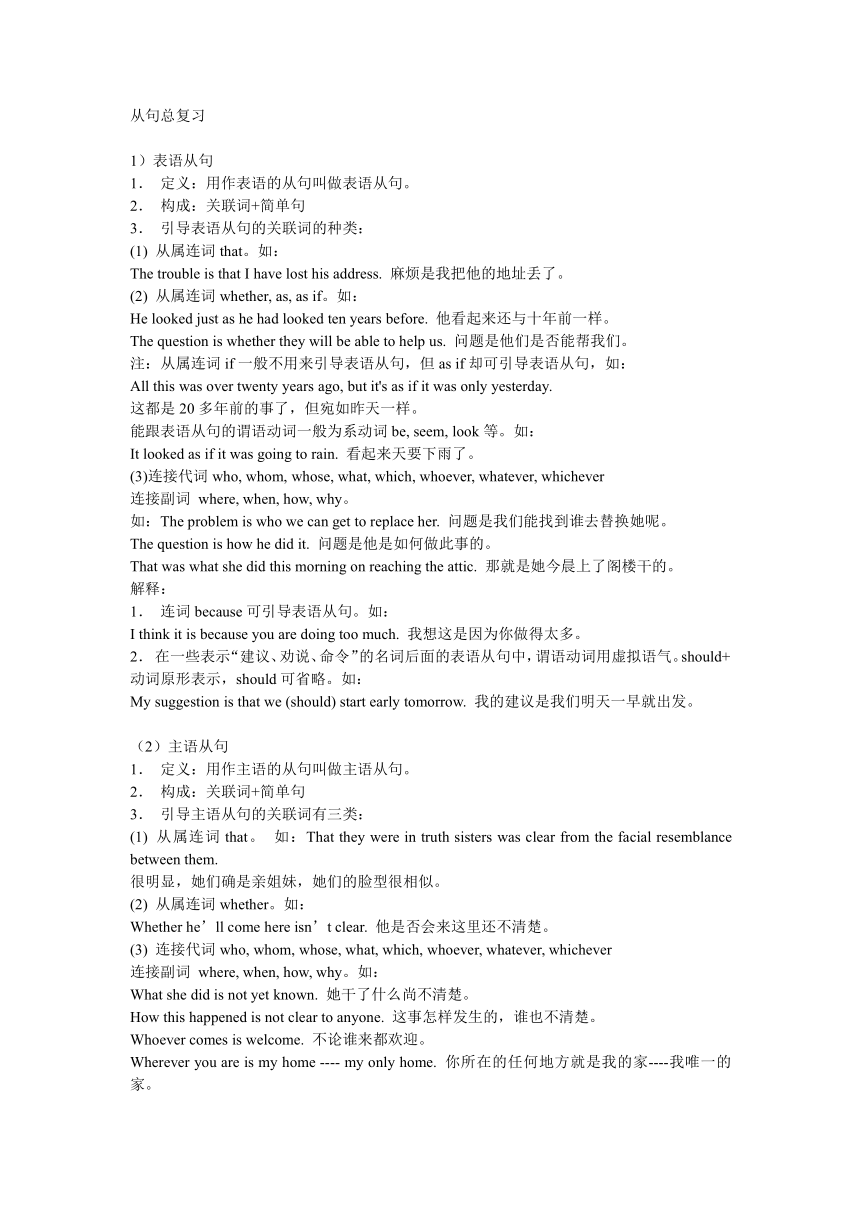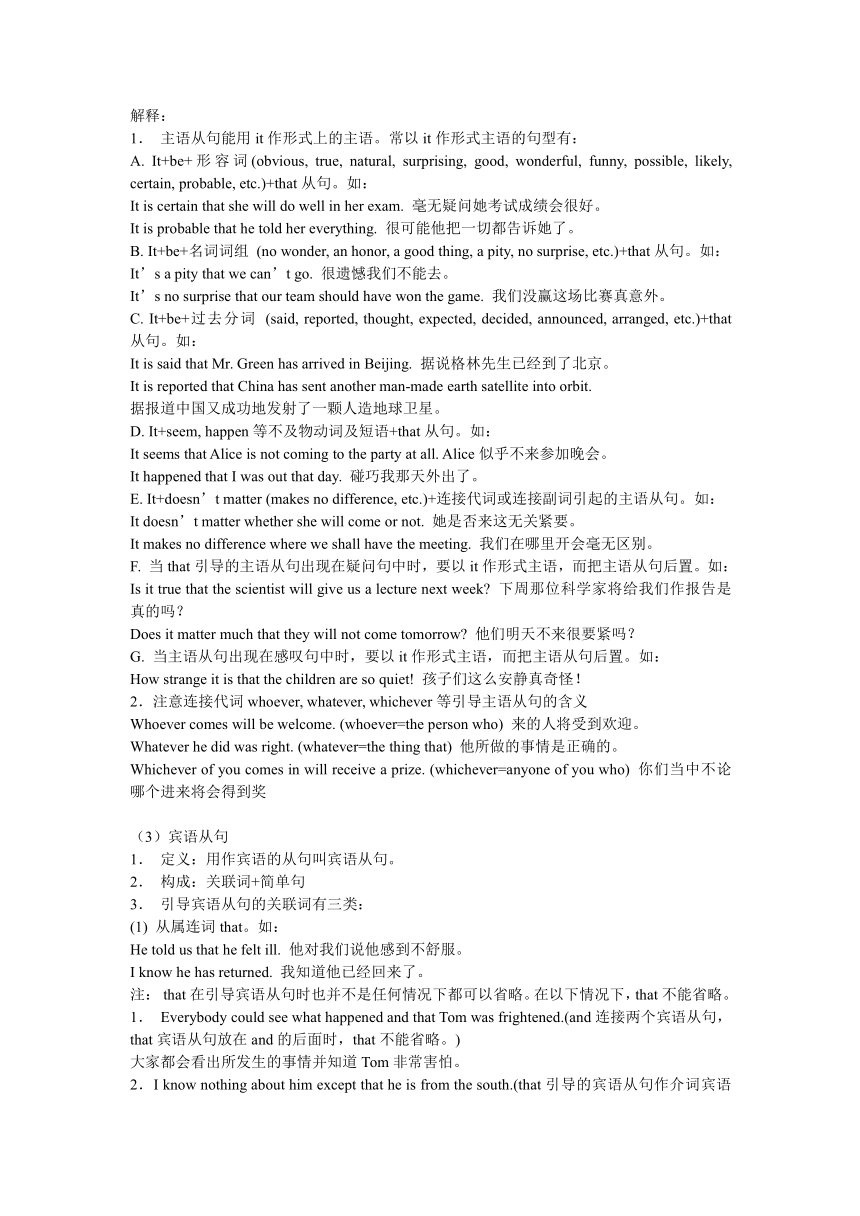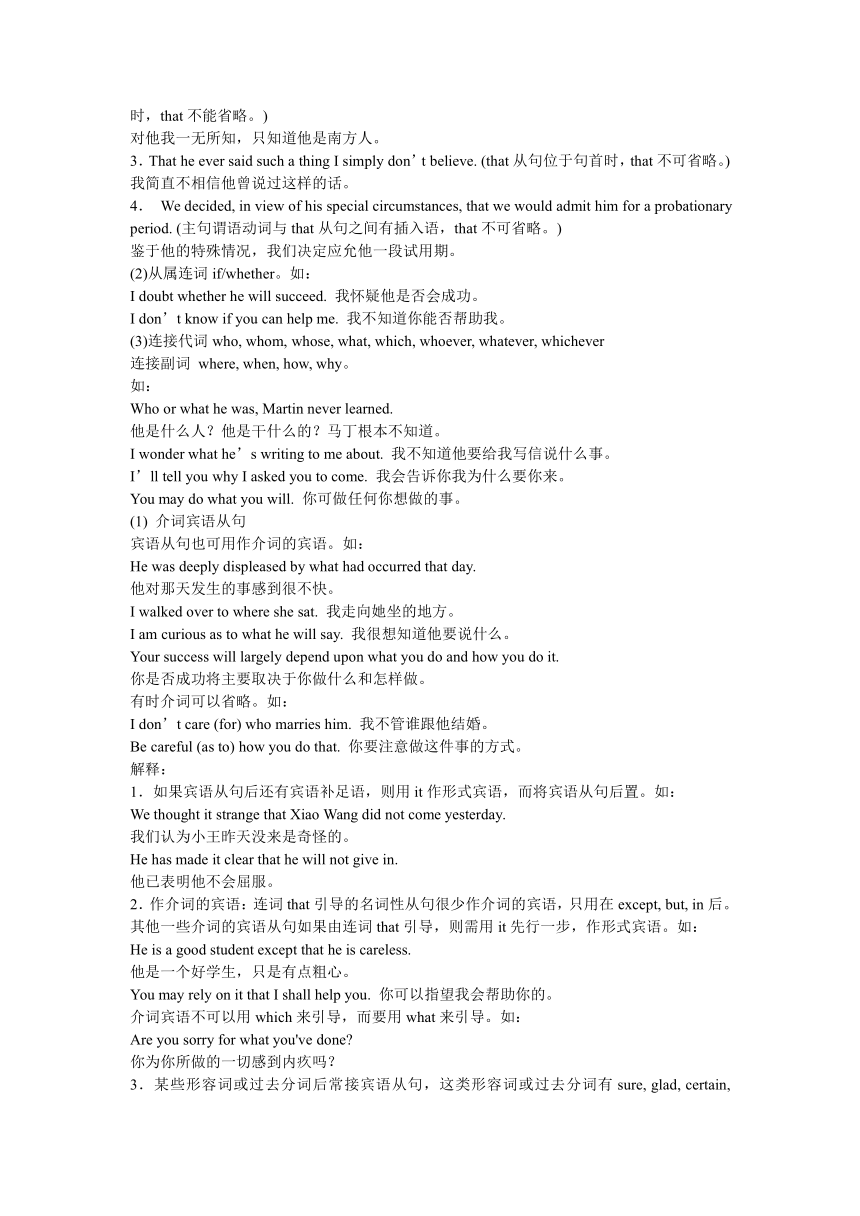从句总复习[上学期]
图片预览



文档简介
从句总复习
1)表语从句
1. 定义:用作表语的从句叫做表语从句。
2. 构成:关联词+简单句
3. 引导表语从句的关联词的种类:
(1) 从属连词that。如:
The trouble is that I have lost his address. 麻烦是我把他的地址丢了。
(2) 从属连词whether, as, as if。如:
He looked just as he had looked ten years before. 他看起来还与十年前一样。
The question is whether they will be able to help us. 问题是他们是否能帮我们。
注:从属连词if一般不用来引导表语从句,但as if却可引导表语从句,如:
All this was over twenty years ago, but it's as if it was only yesterday.
这都是20多年前的事了,但宛如昨天一样。
能跟表语从句的谓语动词一般为系动词be, seem, look等。如:
It looked as if it was going to rain. 看起来天要下雨了。
(3)连接代词who, whom, whose, what, which, whoever, whatever, whichever
连接副词 where, when, how, why。
如:The problem is who we can get to replace her. 问题是我们能找到谁去替换她呢。
The question is how he did it. 问题是他是如何做此事的。
That was what she did this morning on reaching the attic. 那就是她今晨上了阁楼干的。
解释:
1. 连词because可引导表语从句。如:
I think it is because you are doing too much. 我想这是因为你做得太多。
2. 在一些表示“建议、劝说、命令”的名词后面的表语从句中,谓语动词用虚拟语气。should+动词原形表示,should可省略。如:
My suggestion is that we (should) start early tomorrow. 我的建议是我们明天一早就出发。
(2)主语从句
1. 定义:用作主语的从句叫做主语从句。
2. 构成:关联词+简单句
3. 引导主语从句的关联词有三类:
(1) 从属连词that。 如:That they were in truth sisters was clear from the facial resemblance between them.
很明显,她们确是亲姐妹,她们的脸型很相似。
(2) 从属连词whether。如:
Whether he’ll come here isn’t clear. 他是否会来这里还不清楚。
(3) 连接代词who, whom, whose, what, which, whoever, whatever, whichever
连接副词 where, when, how, why。如:
What she did is not yet known. 她干了什么尚不清楚。
How this happened is not clear to anyone. 这事怎样发生的,谁也不清楚。
Whoever comes is welcome. 不论谁来都欢迎。
Wherever you are is my home ---- my only home. 你所在的任何地方就是我的家----我唯一的家。
解释:
1. 主语从句能用it作形式上的主语。常以it作形式主语的句型有:
A. It+be+形容词(obvious, true, natural, surprising, good, wonderful, funny, possible, likely, certain, probable, etc.)+that从句。如:
It is certain that she will do well in her exam. 毫无疑问她考试成绩会很好。
It is probable that he told her everything. 很可能他把一切都告诉她了。
B. It+be+名词词组 (no wonder, an honor, a good thing, a pity, no surprise, etc.)+that从句。如:
It’s a pity that we can’t go. 很遗憾我们不能去。
It’s no surprise that our team should have won the game. 我们没赢这场比赛真意外。
C. It+be+过去分词 (said, reported, thought, expected, decided, announced, arranged, etc.)+that从句。如:
It is said that Mr. Green has arrived in Beijing. 据说格林先生已经到了北京。
It is reported that China has sent another man-made earth satellite into orbit.
据报道中国又成功地发射了一颗人造地球卫星。
D. It+seem, happen等不及物动词及短语+that从句。如:
It seems that Alice is not coming to the party at all. Alice似乎不来参加晚会。
It happened that I was out that day. 碰巧我那天外出了。
E. It+doesn’t matter (makes no difference, etc.)+连接代词或连接副词引起的主语从句。如:
It doesn’t matter whether she will come or not. 她是否来这无关紧要。
It makes no difference where we shall have the meeting. 我们在哪里开会毫无区别。
F. 当that引导的主语从句出现在疑问句中时,要以it作形式主语,而把主语从句后置。如:
Is it true that the scientist will give us a lecture next week 下周那位科学家将给我们作报告是真的吗?
Does it matter much that they will not come tomorrow 他们明天不来很要紧吗?
G. 当主语从句出现在感叹句中时,要以it作形式主语,而把主语从句后置。如:
How strange it is that the children are so quiet! 孩子们这么安静真奇怪!
2.注意连接代词whoever, whatever, whichever等引导主语从句的含义
Whoever comes will be welcome. (whoever=the person who) 来的人将受到欢迎。
Whatever he did was right. (whatever=the thing that) 他所做的事情是正确的。
Whichever of you comes in will receive a prize. (whichever=anyone of you who) 你们当中不论哪个进来将会得到奖
(3)宾语从句
1. 定义:用作宾语的从句叫宾语从句。
2. 构成:关联词+简单句
3. 引导宾语从句的关联词有三类:
(1) 从属连词that。如:
He told us that he felt ill. 他对我们说他感到不舒服。
I know he has returned. 我知道他已经回来了。
注: that在引导宾语从句时也并不是任何情况下都可以省略。在以下情况下,that不能省略。
1. Everybody could see what happened and that Tom was frightened.(and连接两个宾语从句,that宾语从句放在and的后面时,that不能省略。)
大家都会看出所发生的事情并知道Tom非常害怕。
2.I know nothing about him except that he is from the south.(that引导的宾语从句作介词宾语时,that不能省略。)
对他我一无所知,只知道他是南方人。
3.That he ever said such a thing I simply don’t believe. (that从句位于句首时,that不可省略。)
我简直不相信他曾说过这样的话。
4. We decided, in view of his special circumstances, that we would admit him for a probationary period. (主句谓语动词与that从句之间有插入语,that不可省略。)
鉴于他的特殊情况,我们决定应允他一段试用期。
(2)从属连词if/whether。如:
I doubt whether he will succeed. 我怀疑他是否会成功。
I don’t know if you can help me. 我不知道你能否帮助我。
(3)连接代词who, whom, whose, what, which, whoever, whatever, whichever
连接副词 where, when, how, why。
如:
Who or what he was, Martin never learned.
他是什么人?他是干什么的?马丁根本不知道。
I wonder what he’s writing to me about. 我不知道他要给我写信说什么事。
I’ll tell you why I asked you to come. 我会告诉你我为什么要你来。
You may do what you will. 你可做任何你想做的事。
(1) 介词宾语从句
宾语从句也可用作介词的宾语。如:
He was deeply displeased by what had occurred that day.
他对那天发生的事感到很不快。
I walked over to where she sat. 我走向她坐的地方。
I am curious as to what he will say. 我很想知道他要说什么。
Your success will largely depend upon what you do and how you do it.
你是否成功将主要取决于你做什么和怎样做。
有时介词可以省略。如:
I don’t care (for) who marries him. 我不管谁跟他结婚。
Be careful (as to) how you do that. 你要注意做这件事的方式。
解释:
1.如果宾语从句后还有宾语补足语,则用it作形式宾语,而将宾语从句后置。如:
We thought it strange that Xiao Wang did not come yesterday.
我们认为小王昨天没来是奇怪的。
He has made it clear that he will not give in.
他已表明他不会屈服。
2.作介词的宾语:连词that引导的名词性从句很少作介词的宾语,只用在except, but, in后。其他一些介词的宾语从句如果由连词that引导,则需用it先行一步,作形式宾语。如:
He is a good student except that he is careless.
他是一个好学生,只是有点粗心。
You may rely on it that I shall help you. 你可以指望我会帮助你的。
介词宾语不可以用which来引导,而要用what来引导。如:
Are you sorry for what you've done
你为你所做的一切感到内疚吗?
3.某些形容词或过去分词后常接宾语从句,这类形容词或过去分词有sure, glad, certain, pleased, happy, afraid, surprised, satisfied等,连词that可省略。如:
I am not sure what I ought to do.
我不能确定我该做什么。
I'm afraid you don't understand what I said.
恐怕你没领会我说的意思。
I'm surprised that I didn't see all that before.
我好奇怪,我以前没看到过。
Mother was very pleased her daughter had passed the exams.
妈妈为她的女儿通过了考试而感到高兴。
4.连词whether (…or not)或if引导的宾语从句
if和whether引导的宾语从句可以互换使用,但whether常和or not连用,if一般不与or not连用。如:
I wonder whether it is true or not. 我不知它是真是假。
用if引导宾语从句如果会引起歧义,应避免使用if而用wheter。试比较:
Please let me know if you want to go.
Please let me know whether you want to go.
if从句可理解为宾语从句,意为“请告诉我你是否想去”;此句又可理解为条件状语从句意为“如果你想去的话,请告诉我一声”。
5.宾语从句的否定转移。在think, believe, suppose, expect等动词后的宾语从句,有时谓语尽管是否定意思,却不用否定形式,而将think等动词变为否定形式。如:
I don’t think you are right. 我认为你错了。
I don’t believe they have finished their work yet. 我相信他们还未完成他们的工作。
I don’t suppose he cares, does he 我想他不在意,是吗?
6. 宾语从句的时态变化规律:
(1) 当主句是一般现在时态时,从句可根据需要用任何时态。
(2) 当主句是一般过去时态时,从句只能使用过去范围内的任何时态。但客观真理除外。如:
The teacher said that the earth goes round the sun.
老师说地球绕着太阳运行。
(4)同位语从句
1. 定义:用作同位语的从句叫做同位语从句。
2. 用法:同位语从句的先行词多为fact, news, idea, thought, question, reply, report, remark等,关联词多用从属连词that。如:
They were all very much worried over the fact that you were sick.
对你生病这件事,他们都很焦虑。
Where did you get the idea that I could not come
你在哪儿听说我不能来?
Early in the day came the news that Germany had declared war on Russia.
德国已对俄国宣战的消息一大早就传来了。
注:同位语从句偶尔由从属连词whether引导。如:
I have no idea whether he’ll come or not. 我不知道他是否来。
连接代词who, which, what和连接副词where, when, why, how亦可引导同位语从句。
The question who should do the work requires consideration.
谁该干这项工作,这个问题需要考虑。
We haven't yet settled the question where we are going to spend our summer vacation.
到哪儿去度暑假,这个问题我们还没有决定。
It is a question how he did it.
那是一个他如何做了此事的问题。
解释:
1.that引导的同位语从句与定语从句之区别
that引导的同位语从句
that引导的定语从句
句法功能上
that只起连接从句的作用,无意义。在从句中不充当句子成分。不可省。
that替代先行词在从句中不仅起连接作用,还充当一个句子成分。如在从句中作动词的宾语时可省略。
意义上
从句是被修饰名词的内容。
从句起限定作用,是定语
如:The news that Mr. Li will be our new English teacher is true. (同位语从句,that不可省。)
李先生将是我们的新英语老师这个消息是真的。
The news (that) he told me yesterday is true. (定语从句,that在从句中作told的宾语,可省。)
他昨天告诉我的消息是真的。
2.一些表示“建议、命令、要求”的名词后所跟的同位语从句中,谓语动词用虚拟语气should+动词原形表示。should可省。如:
This is our only request that this (should) be settled as soon as possible.
这就是我们唯一的请求:尽快解决这个问题。
(6)不定式的构成
1. 不定式的构成
不定式是由不定式符号to+动词原形构成,在某些情况下to也可省略。
不定式一般有时式和语态的变化,通常有下表中的几种形式(以do为例):
主动式 to do
被动式 to be done
完成式to have done /to have been done
进行式 to be doing
完成进行式 to have been doing
1) 不定式的一般式
不定式的一般式所表示的动作通常与主要谓语的动作同时或几乎同时发生,或是在它之后发生。如:
They invited us to go there this summer. 他们邀请我们今年夏天去那儿。
He stood aside for me to pass. 他站到一边让我通过。
2) 不定式的完成式
不定式的完成式所表示的动作在谓语所表示的动作之后发生,它在句中可作表语、状语、宾语,有时也可作主语、定语等。如:
She seemed to have heard about this matter. 她似乎已听说过这件事。
I meant to have told you about it, but I happened to have an important thing to do.
我本来想告诉你这件事的,但我碰巧有一件重要的事要做。
3) 不定式的进行式
不定式的进行式表示正在进行的与谓语动词同时发生的动作。它在句中可以用作除谓语以外的所有成分。如:
It’s nice of you to be helping us these days. 你真好,这些天一直帮我们。
He pretended to be listening to the teacher carefully. 他假装在认真地听老师讲课。
4) 不定式的完成进行式
如果不定式表示的动作是谓语所表示时间之前一直进行的动作,就需要用完成进行式。如:
They are said to have been working in Tibet for 20 years. 据说他们已经在西藏工作20年了。
We are happy to have been helping each other these days. 我们很高兴这些天能互相帮助。
5) 动词不定式的否定形式是由not或never加不定式构成。如:
Try not to be late again next time. 尽量下次不要再迟到。
He wished us never to meet her again. 他希望我们永远不要再见到她。
6) 疑问词+动词不定式:
不定式和疑问词whether, what, which, whom, where, when, how, why等连用可以在句中起名词的作用,通常跟在tell, know, show, decide, learn, wonder, explain, advise, teach, discuss, find out等动词后面作宾语,有时也可以充当主语、表语等。如:
On hearing the news, he didn't know whether to laugh or to cry.
听到这个消息,他不知道该哭还是该笑。
When to hold the meeting has not decided. 什么时候开会还没有决定。
介词后一般不直接接不定式,但可以接疑问词+不定式短语作宾语。如:
Mary gave some advice on how to learn English. 玛丽提了一些如何学习英语的建议。
I have no idea of how to do it. 我不知道该怎么做。
1)表语从句
1. 定义:用作表语的从句叫做表语从句。
2. 构成:关联词+简单句
3. 引导表语从句的关联词的种类:
(1) 从属连词that。如:
The trouble is that I have lost his address. 麻烦是我把他的地址丢了。
(2) 从属连词whether, as, as if。如:
He looked just as he had looked ten years before. 他看起来还与十年前一样。
The question is whether they will be able to help us. 问题是他们是否能帮我们。
注:从属连词if一般不用来引导表语从句,但as if却可引导表语从句,如:
All this was over twenty years ago, but it's as if it was only yesterday.
这都是20多年前的事了,但宛如昨天一样。
能跟表语从句的谓语动词一般为系动词be, seem, look等。如:
It looked as if it was going to rain. 看起来天要下雨了。
(3)连接代词who, whom, whose, what, which, whoever, whatever, whichever
连接副词 where, when, how, why。
如:The problem is who we can get to replace her. 问题是我们能找到谁去替换她呢。
The question is how he did it. 问题是他是如何做此事的。
That was what she did this morning on reaching the attic. 那就是她今晨上了阁楼干的。
解释:
1. 连词because可引导表语从句。如:
I think it is because you are doing too much. 我想这是因为你做得太多。
2. 在一些表示“建议、劝说、命令”的名词后面的表语从句中,谓语动词用虚拟语气。should+动词原形表示,should可省略。如:
My suggestion is that we (should) start early tomorrow. 我的建议是我们明天一早就出发。
(2)主语从句
1. 定义:用作主语的从句叫做主语从句。
2. 构成:关联词+简单句
3. 引导主语从句的关联词有三类:
(1) 从属连词that。 如:That they were in truth sisters was clear from the facial resemblance between them.
很明显,她们确是亲姐妹,她们的脸型很相似。
(2) 从属连词whether。如:
Whether he’ll come here isn’t clear. 他是否会来这里还不清楚。
(3) 连接代词who, whom, whose, what, which, whoever, whatever, whichever
连接副词 where, when, how, why。如:
What she did is not yet known. 她干了什么尚不清楚。
How this happened is not clear to anyone. 这事怎样发生的,谁也不清楚。
Whoever comes is welcome. 不论谁来都欢迎。
Wherever you are is my home ---- my only home. 你所在的任何地方就是我的家----我唯一的家。
解释:
1. 主语从句能用it作形式上的主语。常以it作形式主语的句型有:
A. It+be+形容词(obvious, true, natural, surprising, good, wonderful, funny, possible, likely, certain, probable, etc.)+that从句。如:
It is certain that she will do well in her exam. 毫无疑问她考试成绩会很好。
It is probable that he told her everything. 很可能他把一切都告诉她了。
B. It+be+名词词组 (no wonder, an honor, a good thing, a pity, no surprise, etc.)+that从句。如:
It’s a pity that we can’t go. 很遗憾我们不能去。
It’s no surprise that our team should have won the game. 我们没赢这场比赛真意外。
C. It+be+过去分词 (said, reported, thought, expected, decided, announced, arranged, etc.)+that从句。如:
It is said that Mr. Green has arrived in Beijing. 据说格林先生已经到了北京。
It is reported that China has sent another man-made earth satellite into orbit.
据报道中国又成功地发射了一颗人造地球卫星。
D. It+seem, happen等不及物动词及短语+that从句。如:
It seems that Alice is not coming to the party at all. Alice似乎不来参加晚会。
It happened that I was out that day. 碰巧我那天外出了。
E. It+doesn’t matter (makes no difference, etc.)+连接代词或连接副词引起的主语从句。如:
It doesn’t matter whether she will come or not. 她是否来这无关紧要。
It makes no difference where we shall have the meeting. 我们在哪里开会毫无区别。
F. 当that引导的主语从句出现在疑问句中时,要以it作形式主语,而把主语从句后置。如:
Is it true that the scientist will give us a lecture next week 下周那位科学家将给我们作报告是真的吗?
Does it matter much that they will not come tomorrow 他们明天不来很要紧吗?
G. 当主语从句出现在感叹句中时,要以it作形式主语,而把主语从句后置。如:
How strange it is that the children are so quiet! 孩子们这么安静真奇怪!
2.注意连接代词whoever, whatever, whichever等引导主语从句的含义
Whoever comes will be welcome. (whoever=the person who) 来的人将受到欢迎。
Whatever he did was right. (whatever=the thing that) 他所做的事情是正确的。
Whichever of you comes in will receive a prize. (whichever=anyone of you who) 你们当中不论哪个进来将会得到奖
(3)宾语从句
1. 定义:用作宾语的从句叫宾语从句。
2. 构成:关联词+简单句
3. 引导宾语从句的关联词有三类:
(1) 从属连词that。如:
He told us that he felt ill. 他对我们说他感到不舒服。
I know he has returned. 我知道他已经回来了。
注: that在引导宾语从句时也并不是任何情况下都可以省略。在以下情况下,that不能省略。
1. Everybody could see what happened and that Tom was frightened.(and连接两个宾语从句,that宾语从句放在and的后面时,that不能省略。)
大家都会看出所发生的事情并知道Tom非常害怕。
2.I know nothing about him except that he is from the south.(that引导的宾语从句作介词宾语时,that不能省略。)
对他我一无所知,只知道他是南方人。
3.That he ever said such a thing I simply don’t believe. (that从句位于句首时,that不可省略。)
我简直不相信他曾说过这样的话。
4. We decided, in view of his special circumstances, that we would admit him for a probationary period. (主句谓语动词与that从句之间有插入语,that不可省略。)
鉴于他的特殊情况,我们决定应允他一段试用期。
(2)从属连词if/whether。如:
I doubt whether he will succeed. 我怀疑他是否会成功。
I don’t know if you can help me. 我不知道你能否帮助我。
(3)连接代词who, whom, whose, what, which, whoever, whatever, whichever
连接副词 where, when, how, why。
如:
Who or what he was, Martin never learned.
他是什么人?他是干什么的?马丁根本不知道。
I wonder what he’s writing to me about. 我不知道他要给我写信说什么事。
I’ll tell you why I asked you to come. 我会告诉你我为什么要你来。
You may do what you will. 你可做任何你想做的事。
(1) 介词宾语从句
宾语从句也可用作介词的宾语。如:
He was deeply displeased by what had occurred that day.
他对那天发生的事感到很不快。
I walked over to where she sat. 我走向她坐的地方。
I am curious as to what he will say. 我很想知道他要说什么。
Your success will largely depend upon what you do and how you do it.
你是否成功将主要取决于你做什么和怎样做。
有时介词可以省略。如:
I don’t care (for) who marries him. 我不管谁跟他结婚。
Be careful (as to) how you do that. 你要注意做这件事的方式。
解释:
1.如果宾语从句后还有宾语补足语,则用it作形式宾语,而将宾语从句后置。如:
We thought it strange that Xiao Wang did not come yesterday.
我们认为小王昨天没来是奇怪的。
He has made it clear that he will not give in.
他已表明他不会屈服。
2.作介词的宾语:连词that引导的名词性从句很少作介词的宾语,只用在except, but, in后。其他一些介词的宾语从句如果由连词that引导,则需用it先行一步,作形式宾语。如:
He is a good student except that he is careless.
他是一个好学生,只是有点粗心。
You may rely on it that I shall help you. 你可以指望我会帮助你的。
介词宾语不可以用which来引导,而要用what来引导。如:
Are you sorry for what you've done
你为你所做的一切感到内疚吗?
3.某些形容词或过去分词后常接宾语从句,这类形容词或过去分词有sure, glad, certain, pleased, happy, afraid, surprised, satisfied等,连词that可省略。如:
I am not sure what I ought to do.
我不能确定我该做什么。
I'm afraid you don't understand what I said.
恐怕你没领会我说的意思。
I'm surprised that I didn't see all that before.
我好奇怪,我以前没看到过。
Mother was very pleased her daughter had passed the exams.
妈妈为她的女儿通过了考试而感到高兴。
4.连词whether (…or not)或if引导的宾语从句
if和whether引导的宾语从句可以互换使用,但whether常和or not连用,if一般不与or not连用。如:
I wonder whether it is true or not. 我不知它是真是假。
用if引导宾语从句如果会引起歧义,应避免使用if而用wheter。试比较:
Please let me know if you want to go.
Please let me know whether you want to go.
if从句可理解为宾语从句,意为“请告诉我你是否想去”;此句又可理解为条件状语从句意为“如果你想去的话,请告诉我一声”。
5.宾语从句的否定转移。在think, believe, suppose, expect等动词后的宾语从句,有时谓语尽管是否定意思,却不用否定形式,而将think等动词变为否定形式。如:
I don’t think you are right. 我认为你错了。
I don’t believe they have finished their work yet. 我相信他们还未完成他们的工作。
I don’t suppose he cares, does he 我想他不在意,是吗?
6. 宾语从句的时态变化规律:
(1) 当主句是一般现在时态时,从句可根据需要用任何时态。
(2) 当主句是一般过去时态时,从句只能使用过去范围内的任何时态。但客观真理除外。如:
The teacher said that the earth goes round the sun.
老师说地球绕着太阳运行。
(4)同位语从句
1. 定义:用作同位语的从句叫做同位语从句。
2. 用法:同位语从句的先行词多为fact, news, idea, thought, question, reply, report, remark等,关联词多用从属连词that。如:
They were all very much worried over the fact that you were sick.
对你生病这件事,他们都很焦虑。
Where did you get the idea that I could not come
你在哪儿听说我不能来?
Early in the day came the news that Germany had declared war on Russia.
德国已对俄国宣战的消息一大早就传来了。
注:同位语从句偶尔由从属连词whether引导。如:
I have no idea whether he’ll come or not. 我不知道他是否来。
连接代词who, which, what和连接副词where, when, why, how亦可引导同位语从句。
The question who should do the work requires consideration.
谁该干这项工作,这个问题需要考虑。
We haven't yet settled the question where we are going to spend our summer vacation.
到哪儿去度暑假,这个问题我们还没有决定。
It is a question how he did it.
那是一个他如何做了此事的问题。
解释:
1.that引导的同位语从句与定语从句之区别
that引导的同位语从句
that引导的定语从句
句法功能上
that只起连接从句的作用,无意义。在从句中不充当句子成分。不可省。
that替代先行词在从句中不仅起连接作用,还充当一个句子成分。如在从句中作动词的宾语时可省略。
意义上
从句是被修饰名词的内容。
从句起限定作用,是定语
如:The news that Mr. Li will be our new English teacher is true. (同位语从句,that不可省。)
李先生将是我们的新英语老师这个消息是真的。
The news (that) he told me yesterday is true. (定语从句,that在从句中作told的宾语,可省。)
他昨天告诉我的消息是真的。
2.一些表示“建议、命令、要求”的名词后所跟的同位语从句中,谓语动词用虚拟语气should+动词原形表示。should可省。如:
This is our only request that this (should) be settled as soon as possible.
这就是我们唯一的请求:尽快解决这个问题。
(6)不定式的构成
1. 不定式的构成
不定式是由不定式符号to+动词原形构成,在某些情况下to也可省略。
不定式一般有时式和语态的变化,通常有下表中的几种形式(以do为例):
主动式 to do
被动式 to be done
完成式to have done /to have been done
进行式 to be doing
完成进行式 to have been doing
1) 不定式的一般式
不定式的一般式所表示的动作通常与主要谓语的动作同时或几乎同时发生,或是在它之后发生。如:
They invited us to go there this summer. 他们邀请我们今年夏天去那儿。
He stood aside for me to pass. 他站到一边让我通过。
2) 不定式的完成式
不定式的完成式所表示的动作在谓语所表示的动作之后发生,它在句中可作表语、状语、宾语,有时也可作主语、定语等。如:
She seemed to have heard about this matter. 她似乎已听说过这件事。
I meant to have told you about it, but I happened to have an important thing to do.
我本来想告诉你这件事的,但我碰巧有一件重要的事要做。
3) 不定式的进行式
不定式的进行式表示正在进行的与谓语动词同时发生的动作。它在句中可以用作除谓语以外的所有成分。如:
It’s nice of you to be helping us these days. 你真好,这些天一直帮我们。
He pretended to be listening to the teacher carefully. 他假装在认真地听老师讲课。
4) 不定式的完成进行式
如果不定式表示的动作是谓语所表示时间之前一直进行的动作,就需要用完成进行式。如:
They are said to have been working in Tibet for 20 years. 据说他们已经在西藏工作20年了。
We are happy to have been helping each other these days. 我们很高兴这些天能互相帮助。
5) 动词不定式的否定形式是由not或never加不定式构成。如:
Try not to be late again next time. 尽量下次不要再迟到。
He wished us never to meet her again. 他希望我们永远不要再见到她。
6) 疑问词+动词不定式:
不定式和疑问词whether, what, which, whom, where, when, how, why等连用可以在句中起名词的作用,通常跟在tell, know, show, decide, learn, wonder, explain, advise, teach, discuss, find out等动词后面作宾语,有时也可以充当主语、表语等。如:
On hearing the news, he didn't know whether to laugh or to cry.
听到这个消息,他不知道该哭还是该笑。
When to hold the meeting has not decided. 什么时候开会还没有决定。
介词后一般不直接接不定式,但可以接疑问词+不定式短语作宾语。如:
Mary gave some advice on how to learn English. 玛丽提了一些如何学习英语的建议。
I have no idea of how to do it. 我不知道该怎么做。
